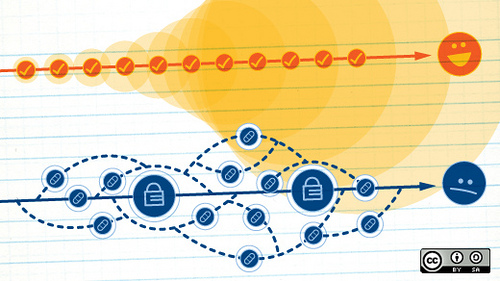We talk all the time about how technology can improve our lives and facilitate richer communication between people who might otherwise have never met or had a conversation. But can you honestly say that these devices and online tools intentionally add happiness to your life? During the first day of SxSWi, I met the creators of three social networks that think the answer should be 'yes.'
As the web, and the tools we connect to it, continue to evolve, companies are becoming aware that emotions are a huge part of how we interact with each other online. Moments of joy, gratitude, and ultimately happiness are what validates our relationships, opinions, and curiosity, and ultimately keeps us coming back for more–whether that be an online game or social network.
Dave Morin, started an online journaling app called Path with the idea of helping people live happier lives by letting them share more frequently with the people they love the most. Using psychological research, Path developers realized that humans can online maintain meaningful relationships with 150 people or less, so on Path, that's the limiting number of connections you can make. This, along with the completely private nature of the network, allows people to feel like they have a trusted place to share. On "Path is like a dinner table," said Morin during the panel discussion. "Who would you welcome into your home? What would you talk about around the dinner table? This is the experience of comfort and intimacy we want to recreate."
If we really stop and think about it, current social networks like Facebook and Twitter are the online versions of using a megaphone to shout single thoughts at a mob. In real life, conversations involve quesyions and answers, give and take. Which is why Ade Olonoh designed Formspring with format that would prompt people to ask and answer questions about themselves and their experiences." We looked at how people really interact offline and thought about how can we could use that to inspire an online experience," said Olonoh during the panel. Interactions on Formspring can't be ignored in the same way a status update or tweet can. Instead the site's function taps into the human need to relate. It uses smiles versus likes, because that's what happens in a real conversation.
And this focus on catalyzing happiness and joy in users isn't just limited to social networks. By incorporating the science of emotion in a completely different way, Kiip (pronouned "keep") has established itself not only a UI but an "emotive" experience designed around harnessing the elements of the happiness that surround video game achievements. Instead of bombarding game players with ads that they would rather pay to avoid, Kiip tethers real life rewards to in-game achievements, ensuring that these products and services are a reinforcement of joy rather than an annoyance.
What all three of these unique services have discovered is that happiness, more than likes or Farmville achievements, is the new currency of our digital world. Rather than devise clever ways to get us to click on links or like a page, web and mobile developers are finding ways to infuse our lives with joy, delight, wonder, and honesty. Using the currency of happiness as their business model, these three companies (and hopefully more) created products that not only capture this emotion beautifully, but also sustain it.
The funny thing is, this "currency of happiness" that technology companies are just now discovering is something that those who embrace the sharing economy have always known: Humans like to do things that make them feel connected and validated. We feel better about ourselves when we're doing something we love and sharing it with people we care about. We realize that life's experiences are far more important than our material possessions, and we're willing to radically change our behaviors to make those experiences better for those we care about.
What experiences, online or not, catalyze happiness in your life?
Does "currency of happiness" seem like a genuine goal for Web 2.0 companies, or is it just a touchy-feely fad?
Join the SxSW discssion by sharing your thoughts in the comments!









